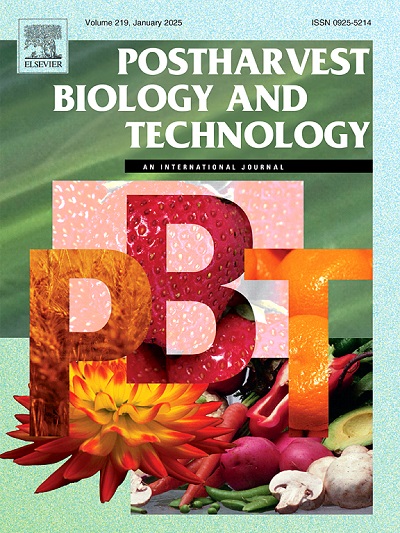aba诱导香蕉乙烯产生和果实成熟的调控模块及其意义
IF 6.8
1区 农林科学
Q1 AGRONOMY
引用次数: 0
摘要
植物激素脱落酸(ABA)影响乙烯生物合成和果实采后的货架期。然而,编码ABA核心信号成分的家族成员负责ABA诱导的乙烯生物合成和果实成熟仍未确定,其潜在机制尚不清楚。在这里,我们证实外源ABA处理诱导乙烯生物合成并加速采后香蕉成熟。结合转录组学分析和编码ABA信号成分和下游转录因子的基因家族信息,我们强调MaPYL3-MaPP2C17-MaSnRK2.3是ABA诱导乙烯产生的主要信号模块之一。在ABA信号的下游,转录因子MabZIP95受ABA处理控制,直接结合香蕉果实成熟过程中乙烯生物合成关键的MbACS7、MbACO2和MbACO3的启动子。该ABA调控模块的表达量在ABA处理后5 d显著升高,与较早、较强的乙烯产量密切相关。此外,还讨论了与aba相关的园艺作物果实成熟过程的比较,表明我们的策略在发现aba调控果实发育的基因方面是有效的。最后,我们的工作揭示了MaPYL3-MaPP2C17-MaSnRK2.3-MabZIP95-MbACS7/MbACO3/MbACO2调控模块,并指出其功能参与aba诱导的香蕉乙烯合成和采后成熟,为分子育种延长香蕉保质期提供了有价值的靶基因。本文章由计算机程序翻译,如有差异,请以英文原文为准。
The regulatory module involved in ABA-induced ethylene production and fruit ripening in banana and its implications
The plant hormone abscisic acid (ABA) affects ethylene biosynthesis and postharvest shelf life of fruits. However, the family members encoding the ABA core signaling components that are responsible for ABA-induced ethylene biosynthesis and fruit ripening remain unidentified, with the underlying mechanism elusive. Here, we confirm that exogenous ABA treatment induces ethylene biosynthesis and accelerates postharvest banana ripening. Combining transcriptomic analysis and the information of gene families encoding ABA signaling components and downstream transcription factors, we highlight MaPYL3-MaPP2C17-MaSnRK2.3 as one of the major signaling modules responsible for ABA-induced ethylene production. Downstream of the ABA signaling, the transcription factor MabZIP95 is controlled by ABA treatment and directly binds to the promoters of MbACS7, MbACO2, and MbACO3, key for ethylene biosynthesis during banana fruit ripening. The expression of this ABA regulatory module was significantly elevated at 5 days postharvest after ABA treatment, well associated with the earlier and stronger ethylene production. Besides, the comparison of the ABA-related fruit ripening process has been discussed between horticultural crops, suggesting our strategy as effective in the gene discovery towards ABA-regulated fruit development. Finally, our work reveals the MaPYL3-MaPP2C17-MaSnRK2.3-MabZIP95-MbACS7/MbACO3/MbACO2 regulatory module and indicates its functional involvement in ABA-induced ethylene synthesis and postharvest ripening in banana, providing valuable target genes for the molecular breeding to extend the shelf-life of banana.
求助全文
通过发布文献求助,成功后即可免费获取论文全文。
去求助
来源期刊

Postharvest Biology and Technology
农林科学-农艺学
CiteScore
12.00
自引率
11.40%
发文量
309
审稿时长
38 days
期刊介绍:
The journal is devoted exclusively to the publication of original papers, review articles and frontiers articles on biological and technological postharvest research. This includes the areas of postharvest storage, treatments and underpinning mechanisms, quality evaluation, packaging, handling and distribution of fresh horticultural crops including fruit, vegetables, flowers and nuts, but excluding grains, seeds and forages.
Papers reporting novel insights from fundamental and interdisciplinary research will be particularly encouraged. These disciplines include systems biology, bioinformatics, entomology, plant physiology, plant pathology, (bio)chemistry, engineering, modelling, and technologies for nondestructive testing.
Manuscripts on fresh food crops that will be further processed after postharvest storage, or on food processes beyond refrigeration, packaging and minimal processing will not be considered.
 求助内容:
求助内容: 应助结果提醒方式:
应助结果提醒方式:


